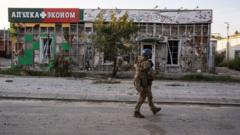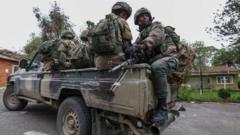Ukraine is backing off its missile attacks on Russian territory as President-elect Trump expresses skepticism about the conflict's direction.
Ukraine Reduces Missile Strikes on Russia Amid Concerns Over Supply and Political Shifts

Ukraine Reduces Missile Strikes on Russia Amid Concerns Over Supply and Political Shifts
As Kyiv faces dwindling missile supplies, Russia navigates a cautious military response to Ukraine's use of Western weaponry.
In a significant shift in strategy, Ukraine has begun to slow the frequency of its missile strikes into Russian territory despite prior assent to use Western long-range missiles. This change comes in response to dwindling missile stocks which have been exacerbated by President-elect Donald J. Trump's public statements, characterizing the use of U.S.-made long-range missiles against Russian targets as a "big mistake."
Initially, Ukraine had unleashed these missiles with notable efficacy against military targets. However, NATO officials noted that, while the strikes were successful in limited contexts, they failed to substantially alter the overall combat dynamics of the ongoing war. Conversely, the conflict has not escalated as many had predicted, despite Russia's launch of a potent intermediate-range hypersonic missile targeting a Ukrainian military infrastructure following the first launches of Western missiles.
Reports from U.S. officials suggest that Russia is strategically curtailing its military responses to mitigate escalation risks, especially with Trump's anti-war stance gaining momentum. The Kremlin has thus far maintained its traditional response tactics, deploying a mix of drones and missiles while issuing threats rather than escalating the conflict further.
As Ukraine grapples with its dwindling arsenal of long-range missiles, the military and political ramifications of this development will have significant implications for the future of the conflict. Public sentiment in both countries is likely to navigate an uncertain path as the power dynamics shift with the incoming U.S. administration.
Initially, Ukraine had unleashed these missiles with notable efficacy against military targets. However, NATO officials noted that, while the strikes were successful in limited contexts, they failed to substantially alter the overall combat dynamics of the ongoing war. Conversely, the conflict has not escalated as many had predicted, despite Russia's launch of a potent intermediate-range hypersonic missile targeting a Ukrainian military infrastructure following the first launches of Western missiles.
Reports from U.S. officials suggest that Russia is strategically curtailing its military responses to mitigate escalation risks, especially with Trump's anti-war stance gaining momentum. The Kremlin has thus far maintained its traditional response tactics, deploying a mix of drones and missiles while issuing threats rather than escalating the conflict further.
As Ukraine grapples with its dwindling arsenal of long-range missiles, the military and political ramifications of this development will have significant implications for the future of the conflict. Public sentiment in both countries is likely to navigate an uncertain path as the power dynamics shift with the incoming U.S. administration.






















